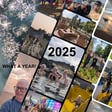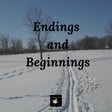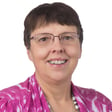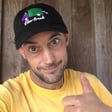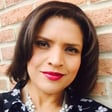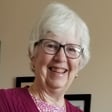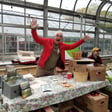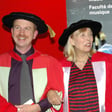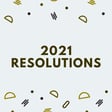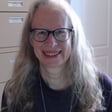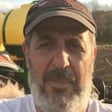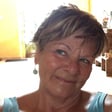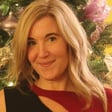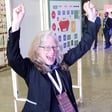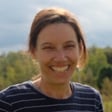Become a Creator today!Start creating today - Share your story with the world!
Start for free
00:00:00
00:00:01

Motivating Youth with Bineta Ba
When I interviewed Bineta Ba, she was the executive director of Toujours Ensemble, a Canadian non profit association that helps youth succeed at school. As of next month, she'll be leading an international development foundation.
Transcript
AT&T Fiber Advertisement
00:00:00
Speaker
Gorgeous gaming, stunning streams, unbelievable bandwidth. It's another Lifestyles of Gagillionaires.
00:00:07
Speaker
Meet the AT&T Fiber customers winning at life with hyper gig speeds. Meet Gagillionaire Terry. While his love of streaming horror movies has him constantly on the edge of his seat, his internet bill won't give him a scare. Oh, don't go in there. I'm telling you. Because since Terry upgraded to AT&T Fiber with hyper gig speeds, he doesn't worry about data capture equipment fees. Come on, man. The door's open for a reason.
00:00:30
Speaker
And best yet, he also doesn't stress about a price increase at 12 months because with the amazing Gagillionaire lifestyle comes an exquisite sense of tranquility. Most of the time. Live like a Gagillionaire. Get straightforward pricing with AT&T fiber, internet that upgrades everything. No data caps, no equipment fees, and no price increase at 12 months. Limited availability in select areas. Visit atd.com slash hypergig for details.
Introduction to Tujouransam
00:01:02
Speaker
My name is Tracey Ariel and I am an apologetically Canadian.
00:01:15
Speaker
And so I am here with Benetta Ba... Is it Ba with Tujouransam? Did I pronounce that correctly, Benetta? That is perfect. Fabulous. And Benetta is the executive director of Tujouransam, which is a local nonprofit that works with youth to try and get them on the right track. Can you talk a little bit
Mission and Programs of Tujouransam
00:01:40
Speaker
about what you do
00:01:41
Speaker
Vanetta, I know you've been there, actually, you've only been there for a couple of years now, right? You're not that long. For five years now, yeah. Five years? Yeah, five years. Time flies. It does, really flies. So can you talk a little bit about what the organization does? So, Tourançon is a youth organization. We help kids, the divergent kids age from six to 17.
00:02:08
Speaker
in the areas of education, academic perseverance more specifically. And we also help them with, we also have a school lunch program because we think that to be able to learn at school, you need first to eat well. And unfortunately in Vernon and other areas in the greater Montreal,
00:02:38
Speaker
We still have many, many families with very low, low income. So these kids, we have around 60 kids who have their lunch each school day at Ruhansam. Each year we help around 500 kids. Most of them actually, we see them from the age of six,
00:03:07
Speaker
to the age of 17. So through all their school years actually at elementary and secondary school. Yeah. I mean, the families that you're working with are fairly vulnerable families too. I mean, when you say that the reason they need the lunch program is because they're often not getting enough to eat at home.
00:03:31
Speaker
Exactly. Sometimes it's actually the only hot meal they have in their days, in the day. So it's really, it's heartbreaking because in a society like ours, we would think that all the kids can eat well, but it's not the case.
00:03:54
Speaker
So we make sure that helping families and the kids, we will tailor our activities so that really we address the main issues. And of course, food is one of them for sure. Food is something absolutely essential.
00:04:15
Speaker
Yeah, and homework help. I know that you do a lot of homework support as well. We have several ways of doing it. It can be really giving the kids a space where they can do their homework, like if they were at home. So it's really, they can do it the way they want. And if they need help, they just ask one of the youth workers.
00:04:43
Speaker
But we also have, it's more with the secondary, at the secondary level, it's more like structured. It's really tutoring. And we have, the kids have to come twice a week and really have tutoring with the help of volunteers. And they need to register to this program. The program is pathways to education.
00:05:12
Speaker
And we follow them through all their secondary years, from secondary one to secondary five, just to make sure that they can graduate. Because the dropout rate in families like theirs, the dropout rate is so high and Quebec's dropout rate is extraordinarily high anyway. It's unfortunately, if I am not wrong, the highest in Canada.
00:05:40
Speaker
And in Quebec, it's in the area of Montreal that we have the highest weights. And if we go a little bit further in areas like Verdun, the situation has really improved a lot.
Impact on Dropout Rates and Inclusivity
00:05:57
Speaker
I mean, in the pastures, I would say the 10 to 15 pastures, but we were around
00:06:04
Speaker
45% drop out rate around 2006, 2007. And today we are around 25. That is still high because in Montreal we are around 19 to 20%
00:06:33
Speaker
It's too high. It improved a lot but still too high, really too high.
00:06:42
Speaker
Yeah, well, and the thing is, but the other thing that I think is really interesting about Tujal and Somme is that you create events so that even kids who are not necessarily vulnerable want to hang out and do things so that it doesn't look like it's a, you know, just for those other kids. Exactly. And it's a very important point because of course we have our main focus is on the vulnerable families and kids.
00:07:09
Speaker
but it's really important for us to remain inclusive and we make sure that because the problems the kids face can be different from just, you know, like the economic situation of the family. This can be because the kid has problems getting along with other kids, so he really needs to socialize.
00:07:35
Speaker
And you can be from a very rich family, but you have those type of problems. So we want to make sure that if a kid wants to come to Johansson, there is a place for him there.
00:07:49
Speaker
Yeah, exactly. Yeah, and well, and even, you know, the homework space, you know, sometimes they just need a quiet place to be because they happen to be in a very hectic situation at home. It's not necessarily, it's struggles of all types. Yeah. I mean, there are, you are dealing with families that have violence and abuse. I mean, we don't want to downgrade the fact that you're helping people of all struggles too. Exactly, exactly. And also the burden
00:08:19
Speaker
certain population is changing and we have some gentrification there, but still it means that with this gentrification, we have to make sure that we still are able to reach out to the most vulnerable families because they tend to disappear in the, you know, like the big picture
00:08:46
Speaker
And all the improvements we see in these areas, and we are very happy to see that we have a nice restaurant, we have nice places, but we shouldn't forget that there are still people living there that need help. So just to adjust our services to remain inclusive, but not to forget the most vulnerable.
00:09:13
Speaker
Yeah. Well, and also to give kids a chance to actually reach out. I mean, it's a, I know that, uh, that you have, uh, well, I don't know this year, 2020 has been such an odd year, but in previous years you did, you know, Thursday night bike repair and, uh, things that would allow anybody to participate as a volunteer or as a, you know, in order to get people connecting together.
Pandemic Adaptations and La Marmit Initiative
00:09:40
Speaker
Exactly. It's really a community based organization. So there is a place for anyone who wants to get involved. So we had this, you know, bike repair work workshop, you say. But we did it also this year, but we opened it to the, you know, like, it was the kids from age
00:10:08
Speaker
do you say the Adolesa? Yeah, the adolescents. They had like an entrepreneurship project and one of the other activities was to have this bike repair workshop. So people come and they give whatever they want and the kids repair their
00:10:32
Speaker
Their bikes, yeah. That gives people a chance to actually get to know the organization too. Exactly, exactly. Well, and one of the other things that you did this summer, which was really innovative when you consider that so many of your programs had to be minimized because we were shut down for so much of the early part of the season when Tijuan-san tends to be well known, you know, when all the graduations were happening, we couldn't do them. All the things that normally happen didn't happen this year.
00:11:02
Speaker
Yeah, but I know that you were doing deliveries too, food deliveries. Yeah, actually we completely transformed our school lunch program into the preparation and delivery of food, not only to the kids that were in the school lunch program, but to the whole family. So we tripled
00:11:32
Speaker
So the community and the people we could serve. And we did that really with the help of all the community, all the donors, everybody was behind us. I think the people understood that was an urgent need to help the family. So we were able to do that. And the team has been so creative
00:12:00
Speaker
and so flexible in changing, in adapting the programs and the services. So this one, we called it La Marmit. So I think you would say the pan maybe in English, not sure. I think it's a roasting pan. Oh, yeah, the roasting pan. And so it was really,
00:12:28
Speaker
We were really happy to be able to adjust this way and to be able to serve more people.
00:12:34
Speaker
Yeah, well, and what an interesting way to make sure that those kids who were actually not getting, could get a meal even though schools were closed. Exactly. And get involved because it was the kids who actually did the deliveries themselves too. Exactly. We really involved them and also what we did, because we were delivering the food, we
00:13:01
Speaker
took this opportunity to also deliver books and activities. So we printed many copies of activities kids could do and we delivered it with the food.
00:13:22
Speaker
oh okay wow that's a that's a really big program and how long did that go for from when until when uh from uh from mid uh april to mid august wow it was 200 meals a day so 1000 meals so compared to 60 meals
00:13:43
Speaker
a day. So we went to 200 meals. And you were doing deliveries, which takes time. Yeah, it takes time. But it was also the opportunity for the youth workers
00:13:56
Speaker
to maintain the contact with the kids because everybody was at home. Everybody was at home. So they were waiting for Audrey and they were knocking at the window when they saw Audrey coming with the delivery and with the activities and the books. So yeah, it was. Oh, what a great way to actually turn things around. And do you have any plans for this winter? Because it looks like it could be a challenging one again.
00:14:23
Speaker
Oh, yeah, it is actually. But we've also we are going to to renew our Christmas campaign to have Christmas. We hand out food baskets to 250 food baskets to the to the 12 families, but also to the we open it to the to the community so that sometimes we
Resilience and Community Collaboration
00:14:49
Speaker
have like people who live alone and for whom
00:14:54
Speaker
The winter is really a big challenge, so we make sure that they will have a basket full of food. So we will deliver them in December. Right, right. So that's going to be another way for people to get involved. And I guess the schools are open now, right? Yeah, they are. So are you doing lunch programs now? We are. Actually, we are doing
00:15:23
Speaker
if there are some kids coming at Jeu An San, but we had to reduce the number of kids we could host at Jeu An San. So we deliver also the food directly to the schools, the two schools. And this year we also started
00:15:49
Speaker
pilot project with another organization involved in food security, La Cantin Portos. We are turning our lunch program into, do you say catering? Catering service? Catering service, yeah. Catering service. So we deliver
00:16:16
Speaker
50 to 60 more lunches to another school. San Juan Joseph Terrove is a new partner for the lunch program, but it's really a pilot. We are trying to see if you can scale the capacity of the lunch program. So we are doing the pilot now and we hope that we will be able to maintain
00:16:46
Speaker
this service after this year. Wow, that's a really big challenge too. So let's, I mean, talk about trying to be flexible, really difficult topic. And we also talk about, actually I should, before I have a couple of questions in particular, but one thing that I wanted to ask you is a little bit of a day in the life, but in terms of
00:17:13
Speaker
a challenge that was really hard to deal with at the time. What was, what would be your, you would say your biggest challenge has been since you, since the five years you've been there? And just describe that like a day in the life type story. You know, what happened and how did the organization respond? I would say, I don't know if it's a, it's a
00:17:40
Speaker
a good example, because it's a little bit maybe not really directly connected to the mission, but we went through a big, do you say flood? Flood, yeah. Flood, yeah. Last year in January. And it has been really, I mean, we had to, we have two buildings.
00:18:05
Speaker
We were lucky enough to have two buildings and we had to shut one of the buildings to close it because really there were so many damages. So we really had to, from there, find new premises to maintain the activities for the kids.
00:18:30
Speaker
And of course to completely change the way we generally work with the kids. So it has been very stressful, very challenging for the whole team and for the kids as well. But what was extraordinary is just to see all the community coming together to help us.
00:18:58
Speaker
So the schools, generally the schools don't have any room, any space. But because we had this situation, they offered a class, a room where we could go and do some of our activities. Our donors reached out to see how they could help. And I would say this was, for me,
00:19:25
Speaker
I knew that Tojo Hansan is really a grassroots organization with many partners, many donors, and really a community behind it and behind the mission. But this food just gave me the confirmation that it was really the case. So it was a challenge. But at the same time, it showed all the strength
00:19:56
Speaker
within the team and within the organization and around the organization. And I think that generally when we face a situation, be it funding problems and we know a lot about it, or just to have to adjust to a pandemic, for an example, or others, we just keep our focus on the mission
00:20:25
Speaker
on the kids and the families. And then we can rely on our partners, our donors to come together and help us. So what happened in the end? Is the building still flooded?
Strategic Partnerships and Activities
00:20:45
Speaker
Oh, no, no. The damage from the flood still there? No, the damage was so long. Actually, we had
00:20:55
Speaker
We wanted to do it like within two months, but it took six months to get all the things done. Hopefully we have our insurance, but more, of course, more expenses than what we wanted to do in the first place. But really, what was,
00:21:22
Speaker
amazing to see it's really everybody coming to help the organization. So now both buildings are functioning again? Both buildings are functioning. Of course, then we have the pandemic and then we have to restart from scratch. Actually, when I was saying that,
00:21:50
Speaker
We always focus on our mission. What are we here for? We are here for the kids and for the families. So how can we do things to just keep on helping them? So when the pandemic started, that's exactly the same thing we did. So we just
00:22:09
Speaker
sat, actually sat, we had our Zoom meeting with the team and said, okay, how do we do that? And I said, okay, let's, we are going to do everything virtual. So yeah, virtual programming, and we call the families, we talk to them, we assess their needs, and we will see how we can, you know, from there, how we can keep on helping them. Wow.
00:22:39
Speaker
How many, when you say the team, how many people work for you? We are 32-32 people. Okay. And then plus you have a grassroots of volunteers and you have- No, of course. Yeah. Each year we have like around 200 volunteers, but we have some volunteers that are in the program. So we're helping us throughout the year.
00:23:03
Speaker
And it's around 50 to 60 volunteers that are with us. And then you have the incredible donors. Yeah, exactly. Exactly. And actually, when we talk about buildings, we should mention that one of those buildings, this is, in many ways, it's a possible model for other organizations because you were given the building as a donation, right?
00:23:27
Speaker
Yeah, yeah. Can you describe that a little bit? Because I think lots of places would like to get their own buildings. Yeah, I'm sure. Oh, yeah, because it's really helped. I mean, you've got to move if you want to help kids who you need stability. So for us to have our own buildings really is a big is a huge asset.
00:23:52
Speaker
So the building actually, we call it the Sainter de Perceverance color, Marcelle Jean-Coutu. And it's Marcelle Jean-Coutu because we were able to get the land from the Marcelle Jean-Coutu family. And then we did a big fundraising with the help of the Renault family.
00:24:20
Speaker
and other donors, and we were able to go and get all the money to build the place. And it was really once again, just a testimony of the network, the wonderful network we have. And we have this, I think we,
Growth and Leadership Reflections
00:24:45
Speaker
We deserve it because we work very hard, but we are happy to see that this network still is with us and we were able to go and have this opportunity to have this building. I mean, the building donated to us and then we
00:25:03
Speaker
We just, we restarted from scratch because the address, the Saint-D'Arce de France, Marcel and Jean-Coutre, it was a clinic, a medical clinic. Yeah, exactly. It was a Jean-Coutre, actually, clinic. So we were able to have it for free. And then from there, go and get some money to build it for the kids.
00:25:28
Speaker
Right, to renovate it all. Can you tell me a little bit about the challenges in that though? Because I know that you say that, I mean, now it looks so easy, but I'm sure it was not an easy process. It was not at all. Actually, I was not dared. It was built, actually, it finished to be built in 2012. And I think
00:25:55
Speaker
Maybe we'll talk to Pierre Cote and Pierre Cote just left before the end of the, but he was the one at the beginning of this adventure, great adventure. So he was the one who was in contact with the Cote family. And so he will have more insights on that. But I knew that it was not, it was actually,
00:26:24
Speaker
I think that there were so many unplanified things. Unplanned, yeah. Unplanned things. And like in all buildings, construction generally, you plant, but it doesn't go the way you plant it.
00:26:45
Speaker
Actually, there's a case with this building. No, exactly. I'm sure there's some great stories in there, but I won't talk about those because if you weren't there, then that's hard to talk about. But can you talk about your connections to other charities in Montreal? Because I know that you are not an island to yourself. Not at all. You do some sharing things. I know that you're part of a network of groups. Can you talk a little bit about those links?
00:27:14
Speaker
Exactly. So we are part of what we would call a national or a provincial network of organizations, just like Tujou Hansam, so that work in school perseverance. So it's really important for us to make sure that we have access to data, we have access to trainings,
00:27:43
Speaker
We have access also to people who can do some advocacy when we have some issues that are really bigger than us. It's important to have those networks to present you, to listen to you, and to understand the reality. So our goal is really to
00:28:07
Speaker
to take what
Conclusion and Call to Action
00:28:08
Speaker
is the situation in Verdun and to make sure that our provincial or our national network or association knows about those issues and can give them a bigger voice, be it at the government or to other institutions. And also in Verdun, we have what we call
00:28:37
Speaker
So it's really the local consultation or network of community organizations, but also it's really a multi-sector network. So they address directly the issues in Verdun, so it's really very rich to be around the table, to be able to talk to
00:29:03
Speaker
all these different sectors because of course we do not have to, we won't say that we will solve all these very complex problems alone. It's absolutely impossible. So it's really by coming together that we will be able to choose the best solution. So for me and for my organization and for the board, it's really important to be part of those different networks.
00:29:29
Speaker
We also work as a group. We really work directly with other community organizations, like the Dawson Center, like Japin Avec Monanfon, who work in literacy. So we make sure to go and get the expertise of the other organization.
00:29:58
Speaker
So, for example, with Japran Avec Monapha, with XAM, we, when we started our elementary level, Perseverance School program at the elementary level, we call it SACADO. We started this program with the help and with the expertise of Japran Avec Monapha. They helped us,
00:30:26
Speaker
organize and structure the, how do we call it, the reading, the reading part of the program was really developed by Jacques-Jacques-Avec-Nouin-Namfa. So this is an example of going and getting the expertise of others so to make sure that what we we offer to the to the kids and to the community is really
00:30:53
Speaker
is relevant and is well documented and that
00:31:00
Speaker
We are doing the good thing, the delightful. I mean, that sort of raises another one of the issues, which is literacy. I mean, learning to read is actually quite difficult if you're in a situation at home where you can't actually do anything. You don't have peace and quiet. You don't have a place to go that's safe. I mean, there's lots of issues that arise because of
00:31:28
Speaker
a vulnerable situation at home. One of the things, I don't know if you work with their programs, but Verdun has the location of the Douglas Hospital network, and this is a network for mental health issues. Do you ever work with them? Not directly, but we refer sometimes when we have some issues like a family or a kid,
00:31:56
Speaker
we will refer them to the different resources within the community. So we don't have a direct collaboration with Douglas, but we know about them. And when needed, we make sure that the families or the kids
00:32:19
Speaker
can access to those resources. Right, right. Yeah, no, it's a big deal. I mean, so we have mental health, we have healthy food, we have homework help and literacy. Are there other issues that we haven't touched on that you're dealing with? Actually, we took on some stutter as, how do you say,
00:32:47
Speaker
Summer camp. Summer camp and leisure, you know, around the leisure activities. And it's still the case and it is still very relevant. We are not only in the academic area or the food security area. So it's really important for us to offer, how do you say it?
00:33:13
Speaker
Fun? Yeah, fun, but accessible activities. So low cost activities. We really want everybody to be able to participate in those activities. So it's really a very important part of our mission. It's also the easiest way to reach out to the kids and to their families.
00:33:43
Speaker
So we really are, we have, our doors are open, the kids come, they register, and they can have all of very varied, very varied activities. So it can be cooking, it can be a theater, it can be a computer. We do also outings in Montreal or,
00:34:12
Speaker
Also, we have an annual, this year we couldn't do it, but we have an annual trip. So there are black kids, between 10 to 15 kids are selected to take part in this trip. And it's really something very, very important in the history of those annual trips.
00:34:38
Speaker
the kids really remember a lot all the you know like all that they they experience during these these trips and so what is a trip is it an exchange trip or a trip to it's not an exchange it's really um actually it's a project in itself it lasts like six to seven months so we select some kids and they will do fundraising uh to to pay for a part of the
00:35:07
Speaker
of the trip and the rest of the money comes from our donors. And then they can go to the north of Quebec or they will go to Vancouver or go to Boston, New York. Generally, we try to remain in Canada or in the United States.
00:35:32
Speaker
But once they went to France, they were able to do this trip to France. So is it about 10 days or two weeks or something? It's one week. It's one week. Yeah, it's one week. And actually, we have generally we do it by we have a bus of 15 seats. Wow.
00:35:58
Speaker
So generally, we choose destinations where we can go by bus. And the trip in itself just to go there is really part of the whole experience. So all this leisure part is really something very important.
00:36:23
Speaker
Right, because it's connecting some of the kids together and also getting them a chance to do something they didn't think they'd be able to do otherwise. Exactly, yeah.
00:36:33
Speaker
We didn't talk about the self-esteem side, but I mean, that's one of the goals as well. I know that because I helped run the farmer's markets, the kids have come to do different projects. They did the eco smoothies for several years this year. They did the bags where they decorated bags and sold them. Yeah, that's our entrepreneur project. So we have been doing like now for two years. And it's really a way to
00:37:04
Speaker
to give them a first work experience, but also to learn to work as a team, because it really works like a cop. So they have to do the marketing, the sales, finance, the HR. So they really go through different kind of learnings and experiences that will
00:37:34
Speaker
be useful for the rest of their lives. So it's really, it's all about giving them the opportunities to test things, to get to know themselves better, to get to interact with others, so to socialize more and to have more confidence in their abilities.
00:38:00
Speaker
And so really to develop their full potential. It's really what we, at the end of the day, that's what we want. And for them to be happy. I know it's a very simplistic to say, but I think it's really important for us to make sure that they access to what any kid must have access
00:38:30
Speaker
Well, and that leads to a question about, two questions about you. And one of them is because obviously the team has to grow in order to serve these wonderful kids. And so as a nonprofit leader, what do you think is the most important growth that you've had since being at Tu Juhan Sam in the last five years? Actually, I came to Juhan Sam at a moment where there was a
00:38:57
Speaker
already a growth, but it really accelerated because we wanted to make sure that all these services, we have some other programs work well, one with the other. So it's really, I don't know the word in English, but I would say we wanted to create a continuum of... That's in English, you've used that too.
00:39:29
Speaker
So really a continuum of services that are coherent and that we will be able to reach as many kids as we were able to and really so we really worked into we had a growth because we set up a new program that is Sakado so the
00:39:54
Speaker
the school perseverance program, but at the elementary level, we already had the secondary one that was Paspo Poma Revisit. And then we saw that it was important to start earlier when we talk about perseverance. So that's why we created the SACADO program in 2015. And we really worked hard to
00:40:22
Speaker
to grow the program. We started with, I think, 20 kids, and now we have 90 kids who can register in the program. And doing that, we just wanted to make sure that we don't want to just grow, grow, and grow. That doesn't work. So we have to make sure that all those segments and all those programs really are well attached
00:40:52
Speaker
and that a kid really, when the kid is in this program, he will get the most of that program and then he can move to the other one and just make sure that all this is coherent and that we not duplicate our services or our activity. So it's growing.
00:41:12
Speaker
now a little bit slower than what was there like a couple of years ago, and growing slowly and being more coherent.
00:41:26
Speaker
Right. But that doesn't say how you grew. What has changed your life? Oh, sorry. Excuse me. Maybe I didn't understand. That's a good answer. I liked it. I want to just personalize it a bit. What happened to you over those five years? Oh, my God. I grew so much as a person. I have a personal
00:41:56
Speaker
story with education. That was not very, it was quite not reachable for me from where I come from. And so it's really, I had the opportunity with Tujou Hanasam just to confirm that I was working in something I deeply believe in, with education.
00:42:24
Speaker
So, um, and also I, um, really as a leader, um, I was, that was the first time I had to, I mean, to, to lead such a big team. So I really learned a lot about humility about, um, just letting go being here for the people I knew with, I mean, from a theoretical
00:42:53
Speaker
I mean, it was like more like a theory, but I really had the opportunity to leave it. And so helping people and when I say people for also the kids, the families, but also the team. So helping a team to grow and helping people do what they do and do it better.
00:43:17
Speaker
is really something is very rewarding and I learn a lot about it. I learn a lot from other people. So I would say that maybe I would say that I'm a better person in general with this experience and really very, I'm not sure I'm really,
00:43:45
Speaker
I'm throwing you a question, but... Well, that's what I asked. And that leads to the last question in the podcast, which talks about your relationship to Canada. Do you consider yourself a Canadian? And if so, what does that mean to you? Oh, I definitely consider my... I've been here for 18 years now. Where are you from? I'm originally from Senegal, West of Africa.
00:44:13
Speaker
Uh-huh. Okay. A Francophone country in west of Africa. I lived in France a while and then I immigrated here. So 18 years ago. So now I can probably say that I totally feel Canadian. I'm very, very, very much aligned with the values of the country. So really, um,
00:44:40
Speaker
being respectful, being caring about others, actually being compassionate with others. I can be myself. So this sense of freedom and of also knowing that my kids can dream big. So it's really something that is
00:45:09
Speaker
important for me and that they can find their place here. So I feel that being Canadian is a... Canada definitely has a better place. Yeah. It's better for your part in it. That's for sure. Was there anything that I didn't ask you that you were hoping to talk about? No, I think we...
00:45:40
Speaker
So I am here with Benita. Benita is the executive director of Tujouransam, which is a local nonprofit that works with youth to try and get them on the right track. Can you talk a little bit about what you do
00:46:07
Speaker
Vanetta, I know you've been there, actually, you've only been there for a couple of years now, right? You're not that long. For five years now, yeah. Five years? Yeah, five years, then flies. It does, really flies. So, can you talk a little bit about what the organization does? So, Tourançon is a youth organization. We help kids, the suburban kids age from six to 17.
00:46:34
Speaker
in the areas of education, academic perseverance more specifically. And we also help them with, we also have a school lunch program because we think that to be able to learn at school, you need first to eat well. And unfortunately in Virgin and other areas in the greater Montreal,
00:47:04
Speaker
We still have many, many families with very low, low income. So these kids, we have around 60 kids who have their lunch each school day at Ruhansam. Each year we help around 500 kids. Most of them actually, we see them from the age of six,
00:47:33
Speaker
to the age of 17. So through all their school years actually at elementary and secondary school. Yeah. I mean, the families that you're working with are fairly vulnerable families too. I mean, when you say that the reason they need the lunch program is because they're often not getting enough to eat at home.
00:47:57
Speaker
Exactly. Sometimes it's actually the only hot meal they have in their days, in the day. So it's really, it's heartbreaking because in a society like ours, we would think that all the kids can eat well, but it's not the case.
00:48:19
Speaker
So we make sure that helping families and the kids, we will tailor our activities so that really we address the main issues. And of course, food is one of them for sure. Food is something absolutely essential.
00:48:40
Speaker
Yeah, and homework help. I know that you do a lot of homework. Yeah, we do a lot of homework support as well. We have several ways of doing it. It can be really giving the kids a space where they can do their homework, like if they were at home. So it's really, they can do it the way they want. And if they need help, they just ask one of the youth workers.
00:49:09
Speaker
But we also have, it's more with the secondary, at the secondary level, it's more like structured, it's really tutoring. And we have, the kids have to come twice a week and really have tutoring with the help of volunteers. And they need to register to this program. The program is Pathways to Education.
00:49:37
Speaker
And we follow them through all their secondary years, from secondary one to secondary five, just to make sure that they can graduate. Because the dropout rate in families like theirs, the dropout rate is so high and Quebec's dropout rate is extraordinarily high anyway. It's unfortunately, if I am not wrong, the highest in Canada.
00:50:05
Speaker
And in Quebec, it's in the area of Montreal that we have the highest weights. And if we go a little bit further in areas like Verdun, the situation has really improved a lot. I mean, in the pastures, I would say the 10 to 15 pastures, but we were around
00:50:30
Speaker
45% drop out rate around 2006, 2007. And today we are around 25. That is still high because in Montreal we are around 19 to 20%
00:50:59
Speaker
It's too high, too high. It improved a lot but still too high, really too high.
00:51:08
Speaker
Yeah, well, and the thing is, but the other thing that I think is really interesting about Tujal and Somme is that you create events so that even kids who are not necessarily vulnerable want to hang out and do things so that it doesn't look like it's a, you know, just for those other kids. Exactly. And it's a very important point because of course we have our main focus is on the vulnerable families and kids.
00:51:35
Speaker
but it's really important for us to remain inclusive and we make sure that because the problems the kids face can be different from just, you know, like the economic situation of the family. This can be because the kid has problems getting along with other kids, so he really needs to socialize.
00:52:01
Speaker
And you can be from a very rich family, but you have those type of problems. So we want to make sure that if a kid wants to come to Johansson, there is a place for him there.
00:52:15
Speaker
Yeah, exactly. Yeah, and well, and even, you know, the homework space, you know, sometimes they just need a quiet place to be because they happen to be in a very hectic situation at home. It's not necessarily, it's struggles of all types. Yeah, I mean, there are, you are dealing with families that have violence and abuse. I mean, we don't want to downgrade the fact that you're helping people of all struggles too. Exactly, exactly. And also the the the burden
00:52:44
Speaker
burden population is changing. And we have some gentrification there, but still it means that with this gentrification, we have to make sure that we still are able to reach out to the most vulnerable families because they tend to disappear in the, you know, like the big picture,
00:53:11
Speaker
And all the improvements we see in these areas, and we are very happy to see that we have nice restaurants, we have nice places, but we shouldn't forget that there are still people living there that need help. So just to adjust our services to remain inclusive, but not to forget the most vulnerable.
00:53:39
Speaker
Yeah. Well, and also to give kids a chance to actually reach out. I mean, it's a, I know that, uh, that you have, uh, well, I don't know this year, 2020 has been such an odd year, but in previous years you did, you know, Thursday night bike repair and, uh, things that would allow anybody to participate as a volunteer or as a, you know, in order to get people connecting together.
00:54:05
Speaker
Exactly. It's really a community based organization. So there is a place for anyone who wants to get involved. So we had this, you know, bike repair work workshop, you say, but we did it also this year, but we opened it to the, you know, like, it was the kids from age
00:54:34
Speaker
do you say the adolescent? Yeah, the adolescents. They had like an entrepreneurship project and one of the activities was to have this bike repair workshop. So people come and they give whatever they want and the kids repair their
00:54:57
Speaker
Their bikes, yeah. That gives people a chance to actually get to know the organization too. Exactly, exactly. Well, and one of the other things that you did this summer, which was really innovative when you consider that so many of your programs had to be minimized because we were shut down for so much of the early part of the season when Tijuan-san tends to be well known, you know, when all the graduations were happening, we couldn't do them.
00:55:24
Speaker
All the things that normally happen didn't happen this year, but I know that you were doing deliveries too, food deliveries. Yeah, actually we completely transformed our school lunch program into the preparation and delivery of food, not only to the kids that had the
00:55:51
Speaker
that were in the school lunch program, but to the whole family. So we tripled the quantity and the people we could serve. And we did that really with the help of all the community, all the donors. Everybody was behind us. I think the people understood that that was an urgent need.
00:56:19
Speaker
to help the families. So we were able to do that. And the team has been so creative and so flexible in changing, in adapting the programs and the services. So this one, we called it La Marmit. So I think you would say the pen maybe in English, not sure.
00:56:43
Speaker
I think it's a roasting pan. We were really happy to be able to adjust this way and to be able to serve more people.
00:57:00
Speaker
Yeah, well, and what an interesting way to make sure that those kids who were actually not getting, could get a meal even though schools were closed. Exactly. And get involved because it was the kids who actually did the deliveries themselves too. Exactly. We really involved them and also what we did, because we were delivering the food, we
00:57:27
Speaker
took this opportunity to also deliver books and activities. So we printed many copies of activities kids could do and we delivered it with the food.
00:57:48
Speaker
oh okay wow that's a that's a really big program and how long did that go for from when until when uh from uh from mid uh april to mid august wow 200 meals a day so 1000 meals so compared to 60 meals
00:58:09
Speaker
a day. So we went to 200 meals. And you were doing deliveries, which takes time. Yeah, it takes time. But it was also the opportunity for the youth workers to maintain the contact with the kids.
00:58:25
Speaker
because everybody was at home. Everybody was at home. So they were waiting for Audrey and they were knocking at the window when they saw Audrey coming with the delivery and with the activities and the books. So yeah, it was- Oh, what a great way to actually turn things around. And do you have any plans for this winter? Because it looks like it could be a challenging one again. Oh yeah, it is actually. But we've also, we are going to,
00:58:54
Speaker
to renew our Christmas campaign, to have Christmas, we hand out food baskets, 250 food baskets to the 12 families, but also to the, we open it to the community. So that sometimes we have like people who live alone and for whom, maybe the,
00:59:20
Speaker
the winter is really a big challenge. So we make sure that they will have a basket full of food. So we will deliver them in December. Right, right. So and then, yeah, so that's going to be another way for people to get involved. And I guess the schools are open now, right? Yeah, they are. So are you doing lunch programs now? We are actually we are doing
00:59:48
Speaker
There are some kids coming at Jeu An San, but we had to reduce the number of kids we could host at Jeu An San. So we deliver also directly to the schools, the two schools. And this year we also started
01:00:14
Speaker
pilot project with another organization involved in food security, La Cantin Portos. We are turning our lunch program into, do you say catering? Catering service? Catering service, yeah. Catering service. So we deliver 50 to 60
01:00:43
Speaker
more lunches to another school. San Juan Joseph Terreove is a new partner for the lunch program, but it's really a pilot. We are trying to see if you can scale the capacity of the lunch program. So we are doing the pilot now and we hope that we will be able to
01:01:10
Speaker
maintain this service after this year. Wow, that's a really big challenge too. So let's talk about trying to be flexible. It's a really difficult time. Actually, I have a couple of questions in particular, but one thing that I wanted to ask you is a little bit of a day in the life, but in terms of
01:01:39
Speaker
a challenge that was really hard to deal with at the time. What was, what would be your, you would say your biggest challenge has been since you, since the five years you've been there? And just describe that like a day in the life type story, you know, what happened and how did the organization respond? I would say, I don't know if it's a, it's a
01:02:05
Speaker
a good example, because it's a little bit maybe not really directly connected to the mission, but we went through a big, do you say flood? Flood, yeah. Flood, yeah. Last year in January. And it has been really, I mean, we had to, we have two buildings.
01:02:31
Speaker
We were lucky enough to have two buildings and we had to shut one of the buildings to close it because really there were so many damages. So we really had to, from there, find new premises to maintain the activities for the kids.
01:02:56
Speaker
And of course to completely change the way we generally work with the kids. So it has been very stressful, very challenging for the whole team and for the kids as well. But what was extraordinary is just to see all the community coming together to help us.
01:03:23
Speaker
So the schools, generally the schools don't have any room, any space. But because we had this situation, they offered a class, a room where we could go and do some of our activities. Our donors reached out to see how they could help. And I would say this was, for me,
01:03:51
Speaker
I knew that Tojo Hansan is really a grassroots organization with many partners, many donors, and really a community behind it and behind the mission. But this food just gave me the confirmation that it was really the case. So it was a challenge. But at the same time, it showed all the strength
01:04:21
Speaker
within the team and within the organization and around the organization. And I think that generally when we face a situation, be it funding problems and we know a lot about it, or just to have to adjust to a pandemic for an example or others, we just keep our focus on the mission
01:04:50
Speaker
on the kids and the families. And then we can rely on our partners, our donors to come together and help us. So what happened in the end? Is the building still flooded? Oh, no, no. The damage from the floods still there? No, the damage was so long. Actually, we had
01:05:21
Speaker
We wanted to do it like within two months, but it took six months to get all the things done. Hopefully we have our insurance, but more, of course, more expenses than what we wanted to do in the first place. But really, what was,
01:05:48
Speaker
amazing to see it's really everybody coming to help the organization. So now both buildings are functioning again? Both buildings are functioning, of course, with then we have the pandemic and then we have to restart from scratch. So we had to see how actually when I was saying that.
01:06:16
Speaker
We always focus on our mission. What are we here for? We are here for the kids and for the families. So how can we do things to just keep on helping them? So when the pandemic started, that's exactly the same thing we did. So we just
01:06:35
Speaker
sat, actually sat, we had our Zoom meeting with the team and said, okay, how do we do that? And I said, okay, let's, we are going to do everything virtual. So virtual programming, and we call the families, we talk to them, we assess their needs, and we will see how we can, you know, from there, how we can keep on helping them.
01:07:05
Speaker
How many, when you say the team, how many people work for you? We are 32, 32 people. Okay. And then, and then plus you have a grassroots of volunteers. Each year we have like around 200 volunteers, but we have some volunteers that are in the program. So we're helping us throughout the year.
01:07:29
Speaker
And it's around 50 to 60 volunteers that are with us. And then you have the incredible donors. Exactly. Exactly. And actually, when we talk about buildings, we should mention that one of those buildings, this is, in many ways, it's a possible model for other organizations because you were given the building as a donation, right?
01:07:53
Speaker
Yeah, yeah. Can you describe that a little bit? Because I think lots of places would like to get their own buildings. Yeah, I'm sure. Oh, yeah, because it's really helped. I mean, you've got to move if you want to help kids who you need stability. So for us to have our own buildings really is a big is a huge asset.
01:08:17
Speaker
So the building actually, we call it the Saint-Hôtre de Perceverance color, Marcelle Jean-Coutu. And it's Marcelle Jean-Coutu because we were able to get the land from the Marcelle and Jean-Coutu family. And then we did a big fundraising with the help of the Renault family.
01:08:45
Speaker
and other donors, and we were able to go and get all the money to build the place. And it was really, once again, just a testimony of the network, the wonderful network we have. And we have this, I think,
01:09:10
Speaker
We deserve it because we work very hard. But we are happy to see that this network still is with us. And we were able to go and have this opportunity to have this building. I mean, the building donated to us. And then we just restarted from scratch because the address, the Sandeepak Salahans, Mark Salahanshankotu,
01:09:36
Speaker
It was a clinic, a medical clinic. Yeah, exactly. It was a Jean-Coutre, actually, clinic. So we were able to have it for free. And then from there,
01:09:51
Speaker
go and get some money to build it for the kids. Right, to renovate it all. Can you tell me a little bit about the challenges in that though? Because I know that you say that, I mean, now it looks so easy, but I'm sure it was not an easy process. It was not at all. Actually, I was not there. It was built, actually, it finished to be built in 2012. And I think
01:10:21
Speaker
Maybe we'll talk to Pierre Cote. And Pierre Cote just left before the end of the, but he was the one at the beginning of this adventure, great adventure. So he was the one who was in contact with the Cote family. And so he will have more insights on that. But I knew that it was not, it was actually,
01:10:50
Speaker
I think that there were so many unplanified things. Unplanned, yeah. Unplanned things. And like in all buildings, construction generally, you plant, but it doesn't go the way you plant it.
01:11:11
Speaker
Actually, there's a case with this building. No, exactly. I'm sure there's some great stories in there, but I won't talk about those because if you weren't there, then that's hard to talk about. But can you talk about your connections to other charities in Montreal? Because I know that you are not an island to yourself. Not at all. You do some sharing things. I know that you're part of a network of groups. Can you talk a little bit about those links?
01:11:40
Speaker
Exactly. So we are part of what we would call a national or a provincial network of organizations, just like Tujou Hansam, so that work in school perseverance. So it's really important for us to make sure that we have access to data, we have access to trainings,
01:12:09
Speaker
We have access also to people who can do some advocacy when we have some issues that are really bigger than us. It's important to have those networks to present you, to listen to you and to understand the reality. So our goal is really to
01:12:32
Speaker
to take what is the situation in Verdun and to make sure that our provincial or our national network or association knows about those issues and can give them a bigger voice, be it at the government or to other institutions. And also in Verdun, we have what we call
01:13:02
Speaker
So it's really the local consultation or network of community organizations, but also it's really a multi-sector network. So they address directly the issues in Verdun, so it's really very rich to be around the table, to be able to talk to
01:13:28
Speaker
all these different sectors because of course we do not have to, we won't say that we will solve all these very complex problems alone. It's absolutely impossible. So it's really by coming together that we will be able to choose the best solution. So for me and for my organization and for the board, it's really important to be part of those different networks.
01:13:55
Speaker
We also work as a group. We really work directly with other community organizations, like the Dawson Center, like Japin Avec Monanfon, who work in literacy. So we make sure to go and get the expertise of the other organization.
01:14:23
Speaker
So, for example, with Japran Avec Monapha, with XAM, when we started our elementary level, for Sibrant School program at the elementary level, we call it SACADO. We started this program with the help and with the expertise of Japran Avec Monapha. They helped us
01:14:52
Speaker
organize and structure the, how do we call it, the reading, the reading part of the program was really developed by Chopin Avignonafa. So this is an example of going and getting the expertise of others. So to make sure that what we we offer to the to the kids and to the community is really
01:15:19
Speaker
is relevant and is well documented and that
01:15:25
Speaker
We are doing the good thing. I mean, that sort of raises another one of the issues, which is literacy. I mean, learning to read is actually quite difficult if you're in a situation at home where you can't actually do anything. You don't have peace and quiet. You don't have a place to go that's safe. I mean, there's lots of issues that arise because of a vulnerable situation.
01:15:55
Speaker
Exactly. At home. I mean, and one of the things I don't know if you work with their programs, but I mean, Verdun has the location of the Douglas Hospital network. And this is a network for mental health issues. Do you ever work with them? Not directly, but we refer sometimes when we have some issues with like a family or a kid.
01:16:21
Speaker
we will refer them to the different resources within the community. So we don't have a direct collaboration with Douglas, but we know about them. And when needed, we make sure that the families or the kids
01:16:45
Speaker
can access to those resources. Right, right. Yeah, no, it's a big deal. I mean, so we have mental health, we have healthy food, we have homework help and literacy. Are there other issues that we haven't touched on with, that you're dealing with? Actually, we took on some stutter as, how do you say,
01:17:12
Speaker
Summer camp. Summer camp and leisure, you know, around the leisure activities. And it's still the case and it is still very relevant. We are not only in the academic area or the food security area. So it's really important for us to offer, how do you say it,
01:17:39
Speaker
Fun? Yeah, fun, but accessible activities. So low cost activities. We really want everybody to be able to participate in those activities. So it's really a very important part of our mission. It's also the easiest way to reach out to the kids and to their families.
01:18:09
Speaker
So we really are, we have, our doors are open, the kids come, they register, and they can have all of very varied, very varied activities. So it can be cooking, it can be a theater, it can be a computer. We do also outings in Montreal or,
01:18:38
Speaker
Also, we have an annual, this year we couldn't do it, but we have an annual trip. So there are black kids, between 10 to 15 kids are selected to take part in this trip. And it's really something very, very important in the history of to do some of those annual trips.
01:19:04
Speaker
the kids really remember a lot all the, you know, like all that they experience during these trips. And so what is a trip? Is it an exchange trip or a trip? It's not an exchange. It's really actually it's a project in itself. It lasts like six to seven months. So we select some kids and they will do fundraising.
01:19:29
Speaker
to pay for a part of the trip. And the rest of the money comes from our donors. And then they can go to the north of Quebec, or they will go to Vancouver, or go to Boston, New York. Generally, we try to remain in Canada or in the United States.
01:19:58
Speaker
But once they went to France, they were able to do this trip to France. So is it about 10 days or two weeks or something? It's one week. It's one week. It's one week. And actually, we have generally we do it by we have a bus of 15 seats. Wow.
01:20:23
Speaker
So generally, we choose destinations where we can go by bus. And the trip in itself just to go there is really part of the whole experience. So all this leisure part is really something very important to look at.
01:20:49
Speaker
Right, because it's connecting some of the kids together and also getting them a chance to do something they didn't think they'd be able to do otherwise. Exactly, yeah.
01:20:59
Speaker
We didn't talk about the self-esteem side, but I mean, that's one of the goals as well. I know that because I helped run the farmer's markets, the kids have come to do different projects. They did the eco-smoothies for several years this year. They did the bags where they decorated bags and sold them. Yeah, that's our entrepreneur project. So we have been doing now for two years. And it's really a way to
01:21:30
Speaker
to give them a first work experience, but also to learn to work as a team, because it really works like a cop. So they have to do the marketing, the sales, finance, the HR. So they really go through different kind of learnings and experiences that will
01:21:59
Speaker
be useful for the rest of their lives. So it's really, it's all about giving them the opportunities to test things, to get to know themselves better, to get to interact with others, so to socialize more and to have more confidence in their abilities.
01:22:26
Speaker
And so really to develop their full potential. It's really what we, at the end of the day, that's what we want. And for them to be happy. I know it's a very simplistic to say, but I think it's really important for us to make sure that they access to what any kid must have access
01:22:55
Speaker
Well, that leads to a question about two questions about you. And one of them is because obviously the team has to grow in order to serve these wonderful kids. And so as a non-profit leader, what do you think is the most important growth that you've had since being at Tujour-Ansam in the last five years? Actually, I came at Tujour-Ansam at a moment where there was a
01:23:23
Speaker
already a growth, but it really accelerated because we wanted to make sure that all these services, we have some other programs work well, one with the other. So it's really, I don't know the word in English, but I would say we wanted to create a continuum of... That's in English, you've used that too.
01:23:55
Speaker
So really a continuum of services that are coherent and that we will be able to reach as many kids as we were able to and really so we really worked into we had a growth because we set up a new program that is Sakado so the
01:24:19
Speaker
the school perseverance program, but at the elementary level, we have already had the secondary one that was Paspo Poma Revisit. And then we saw that it was important to start earlier when we talk about perseverance. So that's why we created the SACADO program in 2015. And we really worked hard to
01:24:47
Speaker
to grow the program. We started with, I think, 20 kids, and now we have 90 kids who can register in the program. And doing that, we just wanted to make sure that we don't want to just grow, grow, and grow. That doesn't work. So we have to make sure that all those segments and all those programs really are well attached
01:25:17
Speaker
and that a kid really, when the kid is in this program, he will get the most of that program and then he can move to the other one and just make sure that all this is coherent and that we not duplicate our services or our activity. So it's growing.
01:25:37
Speaker
now a little bit slower than what was there like a couple of years ago, and growing slowly and being more coherent.
01:25:52
Speaker
Right. But that doesn't say how you grew. What has changed your life? Oh, sorry. Excuse me. Maybe I didn't understand. No, that's a good answer. I liked it. I want to just personalize it a bit. What happened to you over those five years? Oh, my God. I grew so much as a person. I have a personal
01:26:22
Speaker
story with education. That was not very, it was quite not reachable for me from where I come from. And so it's really, I had the opportunity with Tujourna Assam just to confirm that I was working in something I deeply believe in, with education.
01:26:50
Speaker
So, um, and also I, um, really as a leader, um, I was, that was the first time I had to, I mean, to, to lead such a big team. So I really learned a lot about humility about, um, just letting go being here for the people I knew with, I mean, from a theoretical
01:27:18
Speaker
I mean, it was like more like a theory, but I really had the opportunity to leave it. And so helping people and when I say people for also the kids, the families, but also the team. So helping a team to grow and helping people do what they do and do it better.
01:27:43
Speaker
is really something is very rewarding and I learn a lot about it. I learn a lot from other people. So I would say that maybe I would say that I'm a better person in general with this experience and really very, I'm not sure I'm really,
01:28:11
Speaker
I'm throwing you a question, but... Well, that's what I asked. And that leads to the last question in the podcast, which talks about your relationship to Canada. Do you consider yourself a Canadian? And if so, what does that mean to you? Oh, I definitely consider my... I've been here for 18 years now. Where are you from? I'm originally from Senegal, West of Africa.
01:28:39
Speaker
I lived in France a while and then I immigrated here so 18 years ago. So now I can proudly say that I totally feel Canadian. I'm very very very much aligned with the values of the country so really
01:29:05
Speaker
being respectful, being caring about others, actually being compassionate with others. I can be myself. So this sense of freedom and of also knowing that my kids can dream big. So it's really something that is
01:29:35
Speaker
important for me and that they can find their place here. So I feel that being Canadian is a... Canada definitely has a better place. Yeah. It's better for your part in it. That's for sure. Was there anything that I didn't ask you that you were hoping to talk about? No, I think we
01:30:06
Speaker
We covered many topics. Well, thank you so much for your time. I really appreciate it. Thank you. Thank you, Tracy.
01:30:28
Speaker
Thank you for listening to Unapologetically Canadian. Please consider supporting our podcast for $2.99 a month. Join select listeners and get additional episodes every month.
01:30:52
Speaker
Dan, so glad we were able to meet today. Thanks for coming over. Whoa, what's that? Pretty awesome, right? It's my new FlexiSpot E7 ProPlus standing desk. Goes from sitting to standing with the push of a button. You know, I've been thinking about getting a desk like that. I have back pain from being in a chair all day. But I feel like they're either cheap and flimsy or crazy expensive. That's why I went with FlexiSpot. This desk is super sturdy, but totally affordable. The base is made of automotive grade carbon steel. Sit on it. OK.
01:31:21
Speaker
Hey, this is cool. All right, I want in on one of these. Where do I find FlexiSpot? Just go to their website, flexispot.com, and go right now because they're giving an extra $80 off their already low prices. Go to flexispot.com and use code 80-OFF to get an extra $80 off the E7 ProPlus standing desk, backed by an industry-leading 15-year warranty. Don't wait.
01:31:42
Speaker
This special offer will not last long. Go to flexyspot.com and use code 80-OFF. That's F-L-E-X-I-S-P-O-T.com. Go to flexyspot.com now.


